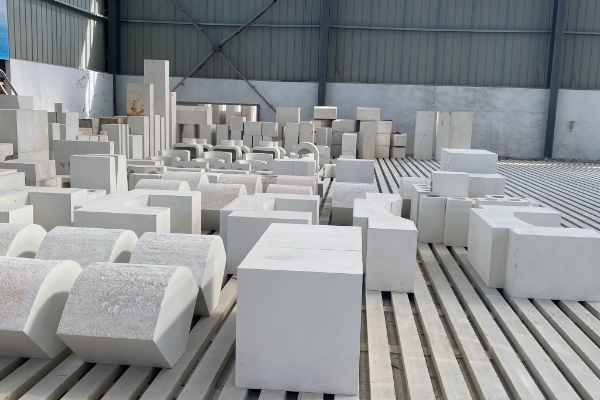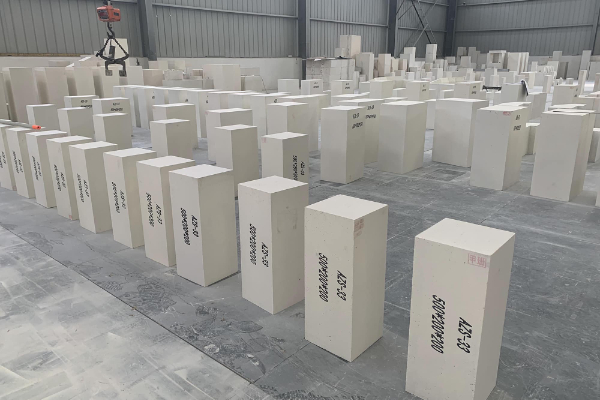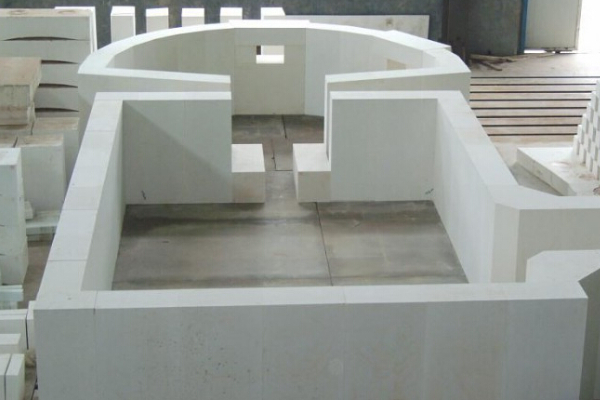Why are fused zirconium corundum bricks seriously corroded in glass electric melting furnaces?
Fused zirconium corundum bricks are also called AZS refractory bricks. During the operation of glass electric melting furnaces, fused zirconium corundum bricks often face serious erosion problems. This kind of erosion mainly manifests itself in two aspects: physical erosion and chemical erosion. These two aspects will be analyzed in detail below.

Analysis of physical erosion of fused zirconium corundum bricks
The physical effect means that during the long-term operation of the glass furnace wall, it is repeatedly subjected to the impact of rapid cooling and rapid heating, and its surface layer must undergo a shrinkage-expansion process. Due to excessive fatigue, the structure of the fused zirconium corundum bricks is damaged, resulting in increased surface cracks and loose structure. Therefore, it will crack and peel under the erosion of airflow, materials, and glass liquid, and this process will be repeated continuously.
Analysis of chemical attack on fused zirconium corundum brick

The corrosion of fused zirconium corundum bricks by chemical effects is more complex and severe, and can be divided into four aspects:
- Precipitation of glass phase
The fused zirconium corundum bricks on the pool wall have long been exposed to high-temperature glass liquid (>1500℃). On the one hand, the glass phase in the bricks will gradually melt and precipitate (the minimum precipitation temperature is about 1150℃); on the other hand, the alkaline glass containing Na2O The liquid will invade into the brick along the pores and cracks of the brick body, diffuse and interpenetrate with the precipitated glass, thus reducing the viscosity and improving fluidity of the precipitated glass liquid, which in turn will intensify the corrosion behavior and extend to depth.
- Skeleton damaged

As the erosion of the glass liquid intensifies in-depth, the skeleton minerals that make up the brick body are gradually infiltrated and surrounded by the Na2O-containing glass liquid, and the skeleton also begins to be eroded. First, the dissolved mullite decomposes into α-Al2O3 and SiO2, promoting the conversion of α-Al2O3 into β-Al2O3. As the temperature increases, all β-Al2O3 is dissolved in the glass liquid, and the baddeleyite and corundum lattice is also damaged, resulting in fragmentation, disintegration, and partial melting. β-Al2O3 gradually dissolves in the glass at high temperatures and rarely remains. With the continuous diffusion and penetration of the glass, baddeleyite microcrystals become free, part of which is taken away with the glass liquid and may become glass stones, and part of which is absorbed by the glass. Keep it. Although baddeleyite can be dissolved into glass, its solubility is minimal. ZrO2 quickly crystallizes from the glass liquid as the temperature fluctuates to form the skeleton or beaded baddeleyite crystals.
- Crystallization of new minerals
Since the skeleton minerals of the bricks are partially melted into the glass liquid, the composition of the original glass liquid is changed. Therefore, when the ratio of SiO2-Al2O3-Na2O in the glass liquid is close to the theoretical composition of nepheline, a large amount of nepheline crystals will precipitate.
Al2O3+2SiO2+Na2O→2NaAlSiO4 (nepheline)
- Damage of nepheline
Since the density of the nepheline is smaller than that of the brick, when the nepheline crystals precipitate, it is accompanied by a larger volume expansion, making the brick structure lose. Although the melting of part of the crystalline phase in the brick at this time will increase the viscosity of the glass liquid and have a certain bonding and protective effect on the loose structure, it still cannot completely block the airflow, material, and glass liquid erosion in the kiln, and the effects of gravity, resulting in cracking, Peel off into the glass liquid and form glass stones. The peeled wound surface continues to be eroded and washed away by the glass liquid and continues to peel off. The result will inevitably lead to erosion and disintegration of the fused zirconium corundum bricks.
 Rongsheng Refractories Factory
Rongsheng Refractories Factory
WeChat
Scan the QR Code with wechat